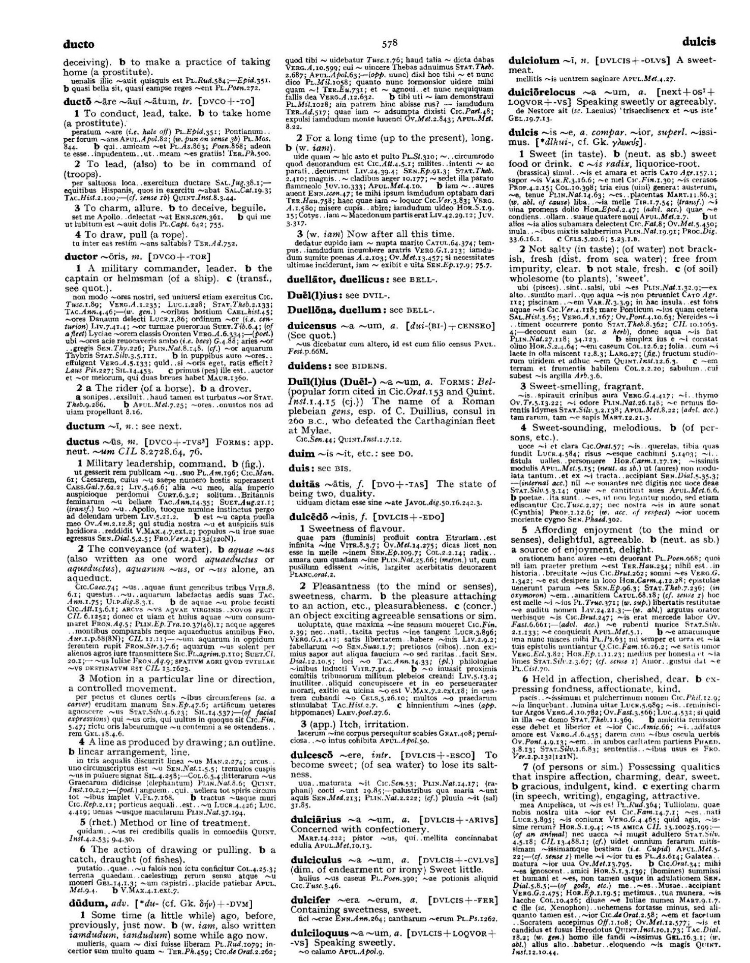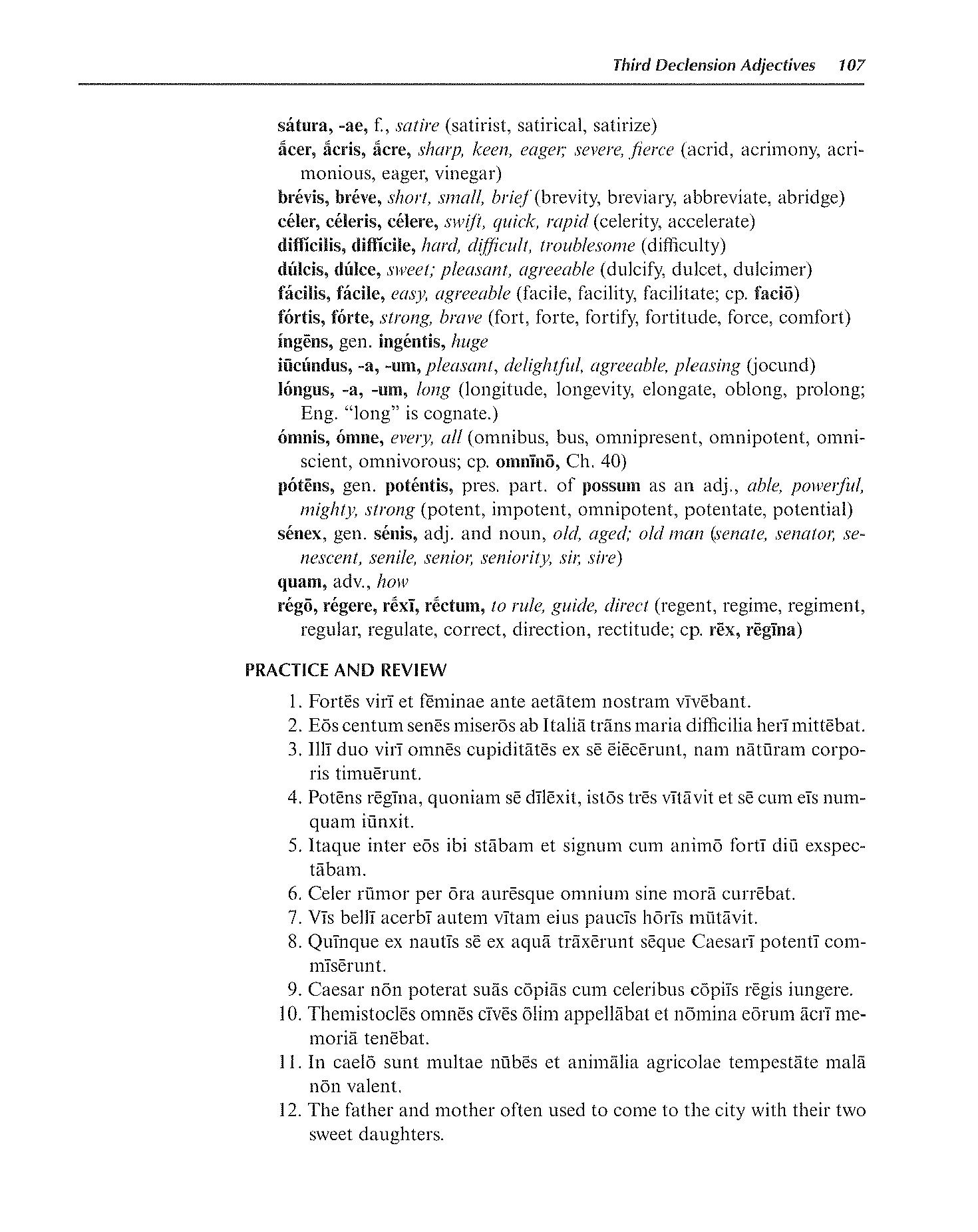
page_listing.tpl
page_subListingDetails.tpl
sub_listingDetails_style1.tpl
sub_listingDetails.title.tpl
dulcis sweet
dulcis is a Latin Adjective that primarily means sweet.
Definitions for dulcis
Wheelock's Latin
Adjective
- 1
sweet, pleasant, agreeable
English derivatives:
dulcify dulcet dulcimer
Oxford Latin Dictionary
Adjective
- 1
Sweet (in taste). (b) (neut. as sb.) sweet food or drink. (c) ~is radix, liquorize-root.
- 2
Not salty (in taste); (of water) not brackish, fresh (dist. from sea water); free from impurity, clear. (b) not stale, fresh. (c) (of soil) wholesome (to plants), 'sweet'.
- 3
Sweet-smelling, fragrant.
- 4
Sweet-sounding, melodious. (b) (of persons, etc.).
- 5
Affording employment (to the mind or senses), delightful agreeable. (b) (neut. as sb.) a source of enjoyment, delight.
Sentences with dulcis
Latin to English
Quam brevis erat dulcis vīta eius!Compare How brief was his sweet life!
Memoria dulcis aetātis mīlia hominum adiuvat.Compare The memory of a sweet period of life helps thousands of men.
Difficilem artem lībertātis dulcis nōn intellēxērunt, nam parvum sapientiae habuērunt.Compare They did not understand the difficult art of sweet liberty, for they had little wisdom.
Beātiōrēs cīvēs prō cīvibus miseriōribus haec dulcia faciēbant.Compare The more fortunate citizens used to do these pleasant things on behalf of the more unfortunate citizens.
Dulcis inexpertis cultura potentis amici: expertus metuit.Compare Making up to a powerful friend seems a pleasant thing to those who have not tried: who has tried will dread it.
Indulge genio, carpamus dulcia, nostrum est quod vivis, cinis et manes et fabula fies. Vive memor leti, fugit hora. hoc quod loquor inde est.Compare Give your genius a chance. Let us gather our sweets! Our life is our own today, tomorrow you will be a dust, a shade, a tale that is told. Live mindful of death, the hour flies, the word that I speak is so much taken from it.
Data sources
Notes
- Definitions
- Frederick M. Wheelock, Wheelock's Latin, 6th ed., rev. Richard A. LaFleur (New York, NY: HarperCollins Publishers, 2005): 107.
- P. G. W. Glare, Oxford Latin Dictionary, Vols. 1-8 (Oxford: Clarendon Press, 1982): 578.
- Word frequencies
- Christopher Francese, "Latin Core Vocabulary," Dickinson College Commentaries, last modified 2014, http://dcc.dickinson.edu.
- Paul B. Diederich, The Frequency of Latin Words and Their Endings, PhD diss., (Columbia University, 1939).
- Louis Delatte, Suzanne Govaerts, Joseph Denooz, and Etienne Evrard, Dictionnaire fréquentiel et index inverse de la langue latine [Frequency Dictionary and Inverse Index of the Latin Language] (Liège, Belgium: Laboratoire d'analyse statistique des langues anciennes de l'Université de Liège [L.A.S.L.A.], 1981): 123.
Bibliography
Allen, Joseph H. Allen and Greenough's New Latin Grammar for Schools and Colleges: Founded on Comparative Grammar. Edited by James B. Greenough, George L. Kittredge, Albert A. Howard, and Benjamin L. D'Ooge. Boston, MA: Ginn & Company, 1903.
Crystal, David. A Dictionary of Linguistics and Phonetics. 6th ed. Oxford, UK: Blackwell Publishing, 2008.
Delatte, Louis, Suzanne Govaerts, Joseph Denooz, and Etienne Evrard. Dictionnaire fréquentiel et index inverse de la langue latine [Frequency Dictionary and Inverse Index of the Latin Language]. Liège, Belgium: Laboratoire d'analyse statistique des langues anciennes de l'Université de Liège (L.A.S.L.A.), 1981.
Diederich, Paul B. The Frequency of Latin Words and Their Endings. PhD diss., Columbia University, 1939.
Francese, Christopher. "Latin Core Vocabulary." Dickinson College Commentaries. Last modified 2014. http://dcc.dickinson.edu/latin-vocabulary-list.
Gildersleeve, Basil L., and Gonzales Lodge. Gildersleeve's Latin Grammar: Third Edition, Revised, and Enlarged. 3rd ed. London, England: Macmillan and Co., 1903.
Glare, Peter G.W. Oxford Latin Dictionary. Vols. 1-8. Oxford, England: Clarendon Press, 1982.
Krüger, Bernd. "Latin Conjugation Tables." Cactus2000. Accessed May 5, 2023. https://latin.cactus2000.de/index.en.php.
Pierson, Nick. "Sound of Text." Accessed October 26, 2019. https://soundoftext.com.
Wheelock, Frederick M. Wheelock's Latin. 6th ed. Revised by Richard A. LaFleur. New York, NY: HarperCollins Publishers, 2005.
Wiktionary Contributors. "Victionarium." Wikimedia Foundation, Inc. Updated March 18, 2019. https://la.wiktionary.org/wiki/Victionarium:Pagina_prima.
Citation
Chicago (17th ed.)
Allo Contributors. "dulcis, dulce (adj.) - Latin Word Definition." Allo Latin Dictionary. Last modified . Accessed January 30, 2026. http://ancientlanguages.org/latin/dictionary/dulcis-dulce.
Entry created on . Last updated on .







